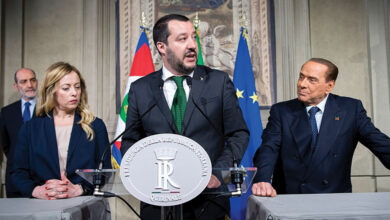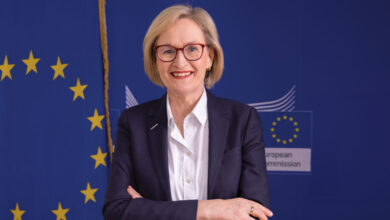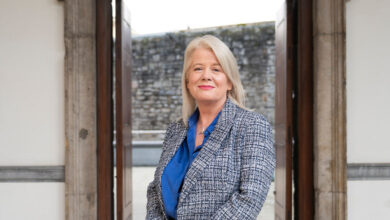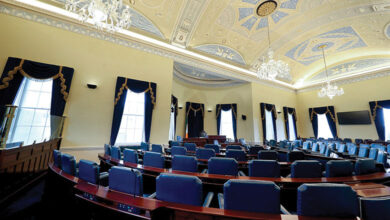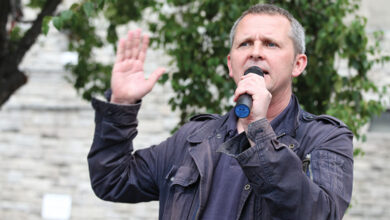Leaders look to 2016
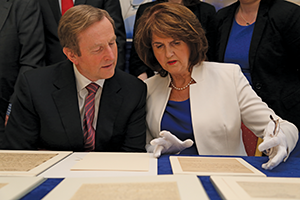
The centenary programme for the Easter Rising commenced in August this year with the commemoration of Jeremiah O’Donovan Rossa’s funeral at Glasnevin cemetery. Ciarán Galway speaks with the four main party leaders to gauge opinion ahead of the major events in 2016.
Why is it important to commemorate the events of Easter 1916 and what benefits can be derived from such a process?
Enda Kenny: The period 1910-1925 was the single most important period in modern Irish history, in particular the decade between 1912 and 1922.
How the events of the period, especially the 1916 Rising, are commemorated is extremely important. If the approach taken was dominated by interpretations of events that reinforce prejudices rather than accurately assessing their impact, justice would not be done to the commemorative process.
This is our history, and our children’s inheritance. We have a duty of care to ensure that the ideals of the Proclamation are understood and appreciated.
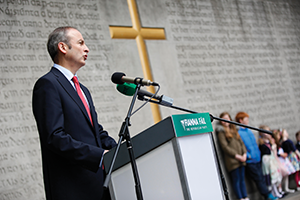 Every nation has seminal events in its history which define it as a people; the 1916 Rising has a resonance within our national identity, not alone in Ireland but for our diaspora. It is fitting and proper that we commemorate that event in as wide and as inclusive a manner as possible.
Every nation has seminal events in its history which define it as a people; the 1916 Rising has a resonance within our national identity, not alone in Ireland but for our diaspora. It is fitting and proper that we commemorate that event in as wide and as inclusive a manner as possible.
It is with that in mind that the Government, in consultation with the All Party Oireachtas Committee, the Expert Advisory Group of Historians, and many other entities, has devised an inclusive, imaginative, year-long programme of remembrance of the past, of reflections on our achievements and of reimagining our Republic for future generations.
Joan Burton: The Proclamation of the Irish Republic shook an empire and created a nation. The 1916 Rising was led by activists, trade unionists, poets, musicians and Gaeilgeoirí.
Those women and men were challenging the Ireland of their parents and they demanded change.
The programme of commemorative events allow us to acknowledge the efforts of our leaders and activists as they pursued our cause of social justice, of equality, and of rights. Those men and women paved the way for us to not only achieve independence, but to create the progressive change which followed.
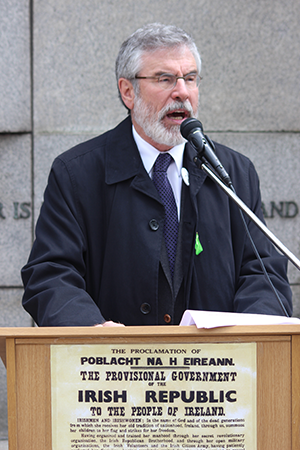 The commemorations give us an opportunity to remember, to reflect, and to keep focused on our efforts to achieve a true republic with citizenship, liberty, social justice, peace, equality and rights at its core.
The commemorations give us an opportunity to remember, to reflect, and to keep focused on our efforts to achieve a true republic with citizenship, liberty, social justice, peace, equality and rights at its core.
Micheál Martin: The centenary of the Easter Rising offers us the opportunity as a nation to cherish and remember those that fought for Irish freedom. We as a nation must reflect on the progressive and radical ideals that the men and women of 1916 sought to advance at a time when Europe was facing into the unknown. We have the opportunity to use the centenary as a way of teaching our children about the fundamental importance of the Easter Rising and how it helped set the course for the development of the modern Irish state.
Gerry Adams: There are countless dates in Ireland’s long struggle for freedom that deserve commemoration but none resonate more deeply in the Irish psyche than the Easter Rising of 1916, a seminal event which shaped our history for the following 100 years. Sinn Féin has commemorated the Rising every year since it occurred.
The centenary celebration of the Easter Rising is a time for citizens to rededicate ourselves to the ideals of equality and freedom, which were the inspiration for the Rising and contained in the Proclamation which is as relevant to the Ireland of 2016 as that of 1916.
While the Centenary must be an opportunity for remembrance, it is also an opportunity for national renewal, for building a new republic. When it has come and gone there should be more left behind than a memory of a good day out.
Of the ideals laid down in the Proclamation, which are the most important to you?
Enda Kenny: The ideals of the Proclamation are universal and are ones that all democrats in any republic would share. It would be wrong to pick one out over the other.
However, as we step into the second century after the Rising, I am happy to say that the ideal of the equal rights and equal opportunities of all citizens enshrined in the Proclamation has been resoundingly reaffirmed by the citizens of this Republic in the marriage equality referendum.
We, the Irish, have proven ourselves as the inheritors of the ideals of the Proclamation in that vote. I see the commemoration as another opportunity to renew our commitment to the Proclamation ideals of liberty and equality.
Joan Burton: The idea that everybody – men and women – are born equal is something that is sometimes taken for granted in 2015, but equality between men and women was quite revolutionary in 1916 when it was enshrined in the Proclamation.
Women played a central role in events around the rising. We remember the fearless leadership of Constance Markiewicz, who was an active member of the Citizen Army at the time of the Rising. She was just one of many women who took up arms and actively engaged in combat. Many others gave support to those who fought. They ran messages, cared for the injured, organised supplies and helped in communicating between points of resistance. We remember Nurse Elizabeth O’Farrell who tendered the surrender on behalf of Pearse when the Rising had run its course. We remember too strong women such as Kathleen Clarke, who made an important contribution to the new State after the Treaty.
Michéal Martin: The ideals set out in the Proclamation declared outside the GPO were republican, radical, and revolutionary. They promised a country of equality, opportunity and prosperity and stated clearly Ireland’s claim to statehood. When Europe was consumed by the most brutal and bloody war in its history, and when the principles of democracy and human rights were in retreat, Pearse, Connolly, Plunkett and their comrades committed our national struggle to taking the opposite way.
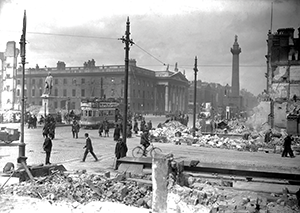 They wanted a republic which worked in the interests “of the whole nation and all of its parts.” They guaranteed “religious and civil liberty, equal rights and equal opportunities” – including universal suffrage. This is the vision which defined them and it is the tradition which led within only a few years to the establishment of what is now one of the world’s oldest democracies.
They wanted a republic which worked in the interests “of the whole nation and all of its parts.” They guaranteed “religious and civil liberty, equal rights and equal opportunities” – including universal suffrage. This is the vision which defined them and it is the tradition which led within only a few years to the establishment of what is now one of the world’s oldest democracies.
Gerry Adams: Equality, freedom, national independence, civil and religious liberty.
Do you think that the current plans for the official state commemoration are sufficient? What additions or improvements, if any, could be made?
Enda Kenny: The Government has committed significant resources to a huge number of initiatives, spanning many academic, cultural, educational and language fields. Central to the Government’s programme is engagement of the citizens. This is happening all over the country and abroad.
Michael Collins described the Rising in the following terms:
“That valiant effort and the martyrdoms that followed it finally awoke the sleeping spirit of Ireland.”
The Centenary Programme, led by the Department of Arts Heritage and the Gaeltacht, covering the seven strands of state ceremonial, historical reflection, the living language, cultural expression, community participation, and the global and diaspora, has unleashed the spirit of innovation, creativity and community participation that we Irish are famous for, at home and abroad. We are a people of imagination and our programme has been designed to capture that.
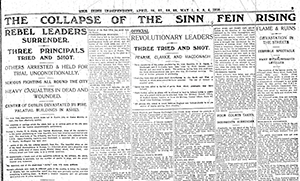 Joan Burton: The Easter Rising of 1916 was probably the most important single event in Irish history and I believe that the commemorative plans are ambitious and comprehensive. They include significant State occasions, but they also give citizens the opportunity to participate in what will be a great national event.
Joan Burton: The Easter Rising of 1916 was probably the most important single event in Irish history and I believe that the commemorative plans are ambitious and comprehensive. They include significant State occasions, but they also give citizens the opportunity to participate in what will be a great national event.
Of course as well as the state celebrations, the Labour Party will also be marking the centenary. For example, we will be setting up a Richard O’Carroll bursary, a 1916 Exhibition; a James Connolly Symposium, and a commemorative weenda kennyend.
Michéal Martin: The centenary should be for all of the people of Ireland to celebrate collectively, and must not be allowed to become politicised by any one party.
Fianna Fáil, as a party inspired by the ideals of the men and women of 1916, will celebrate fully their legacy in 2015 and 2016.
 Gerry Adams: The programme unveiled by the Government last November was widely criticised as short term, shambolic and superficial. Public anger at its promotional video – Ireland Inspires 2016 – was so stinging that it was withdrawn. The new programme is a much better effort but it still contains gaps.
Gerry Adams: The programme unveiled by the Government last November was widely criticised as short term, shambolic and superficial. Public anger at its promotional video – Ireland Inspires 2016 – was so stinging that it was withdrawn. The new programme is a much better effort but it still contains gaps.
The government approach has been to strip away any politics or context to the Rising. This is a shallow and wholly self-serving approach to our history which airbrushes the counter revolutionary period, the Civil war and the dreadful and brutal period during which the State and Partition were reinforced.
Heaven forbid that the North is mentioned or that the continued failure that is partition is debated. That is a mistake and a missed opportunity.
What does the 1916 legacy and the subsequent centenary commemoration mean to you on a personal level?
Enda Kenny: From the early days of this State, Easter has been the time we have chosen to commemorate as marking the birth of our sovereign nation. In that sense it is intrinsic to us as a people, it’s in our DNA, it is our story. It is a story we should tell with pride, as an ancient European people with a culture, language and tradition that we celebrate.
 I am touched by the energy and enthusiasm in every community in Ireland and abroad to commemorate the 1916 Rising. 2016 can and should be a year when we remember our shared history, reflect on our achievements and reimagine our future. It is also a time to reach out to each other within communities here and overseas
I am touched by the energy and enthusiasm in every community in Ireland and abroad to commemorate the 1916 Rising. 2016 can and should be a year when we remember our shared history, reflect on our achievements and reimagine our future. It is also a time to reach out to each other within communities here and overseas 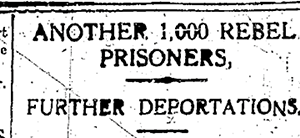 and build lasting friendships. This of course extends to the “new Irish” who have made their homes here and enriched our lives, our communities and our culture with their diversity.
and build lasting friendships. This of course extends to the “new Irish” who have made their homes here and enriched our lives, our communities and our culture with their diversity.
Joan Burton: The legacy of 1916 is one of national self-determination, of free speech, of common ownership of property, of equal treatment before the law. These ideals speak to us with a clarity and simplicity that is simply timeless.
But I don’t see the proclamation as just as an historical item, I see it as a challenge.
It is a challenge to myself, to other political leaders and to the people of Ireland to live up to the ideals of the Republic, to treat all the children of the nation equally and to broaden and deepen the ties of fraternity which unite the people who live on our island.
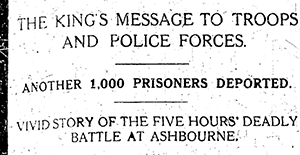 Michéal Martin : The independence our forefathers fought for allowed us to invest in our people through education, health and social services. It allowed us to develop one of the most open dynamic, economies in the world. It allowed us to develop our own national, cultural and social life and the ability to steer our own course through our own democratic institutions.
Michéal Martin : The independence our forefathers fought for allowed us to invest in our people through education, health and social services. It allowed us to develop one of the most open dynamic, economies in the world. It allowed us to develop our own national, cultural and social life and the ability to steer our own course through our own democratic institutions.
Gerry Adams: I am personally very proud and in awe of the men and women of that revolutionary period. The writings, poetry and activism which shaped the Rising remain a very potent source of inspiration. I look forward to the re-popularisation of the poetry and prose, the polemics of Pearse and Connolly and the other leaders.
What do you imagine the leaders of the era would have to say about Ireland today?
Enda Kenny: “It’s your country, look to your children’s future, guard our legacy – but create your own.”
Joan Burton: I suppose I’m more familiar with the vision of James Connolly than that of the other leaders. It is certainly the case that while his vision is not yet complete, people are immeasurably more prosperous than they were a century ago. Significant progress has been made in advancing the rights of workers, something that Connolly would have welcomed, particularly since it came about as a result of political action, led by Labour, the party he himself founded.
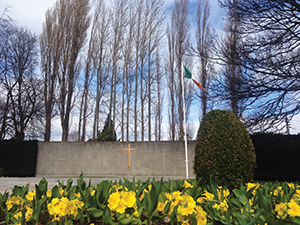 For example, our legislation to establish the Low Pay Commission, recently passed all stages in the Oireachtas. In addition we have legislated for collective bargaining, something that many said would never be done.
For example, our legislation to establish the Low Pay Commission, recently passed all stages in the Oireachtas. In addition we have legislated for collective bargaining, something that many said would never be done.
Most importantly, perhaps, is the progress that has been made in providing jobs to workers. There are 100,000 more people at work now compared to the peak of the unemployment

Michéal Martin: For them rebellion was never an end in itself – taking up arms was justified because no other option was available and because of the systematic frustration of the clearly expressed will of the Irish people. The tradition they renewed, the chain they continued, was never to be defined by the means of struggle but by the principles they set out in the Proclamation.
Gerry Adams: I imagine they would say that the Rising remains unfinished business. They fought to establish the republic which was promised on the steps of the GPO – a 32 county republic in which citizens have equality and rights and where the sovereignty of the nation is defended. So, I think the leaders of the 1916 Rising would encourage those who are struggling today for those ideals.


